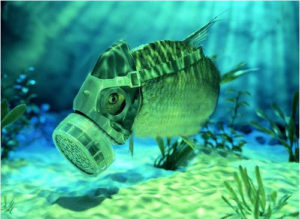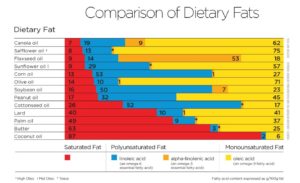
You don’t need to eat fish or take fish oil supplements in order to get sufficient omega-3. In fact, eating fish or taking fish oil supplements just in order to get your omega-3 (also known as n-3) is probably one of the unhealthiest 1 2 ways you could go about ensuring your body is fuelled with this essential fatty acid. So, if not from fish, then where can we get it from?
Shown below are the major plant sources of omega-3 in the form of ALA (alpha linolenic acid) 3, which is known as the ‘parent’ omega-3 fatty acid and can be converted into EPA 4 and DHA 5 (the bioactive long-chain fatty acids) within the body. EPA and DHA are important partly because they can help form eicosanoids 6 (such as prostaglandins 7, prostacyclins 8 , leukotrienes 9 thromboxanes 10 , resolvins 11 and protectins 12 ) which are highly anti-inflammatory. These long-chain fatty acids are vital for the flexibility and functioning of our cell membranes (including, of course, our brain cells).
Blog Contents
Highest plant sources of omega-3
- flax seed contains over 50% ALA
- salvia sclarea (also called clary or clary sage) seed oil contains ~51% ALA
- chia (salvia hispanica) seed contains ~30%
- kukui (candlenut) contains about 30%
- hemp seed contains ~20% 13
- pumpkin seed oil contains up to 15%
- canola contains up to 10%
- walnut oil contains between 3 to 11%
- soybean oil contains between 5 to 7%
The conversion of ALA to EPA and DHA is a relatively slow process which can be interfered with by having too much omega-6 fatty acid (LA or linolenic acid, also known as n-6) 14 in the diet. This is because the omega-6 and omega-3 compete for the same desaturase enzymes 15 which desaturate and elongate the ALA. If there is too high a ratio of omega-6 to omega-3, the conversion of ALA to EPA and DHA can be reduced considerably, and this is not good for the body.
The list below (with % content of LA) shows the oils that are high in omega-6 and, as you can see, these oils are the ones that are used most in the preparation of much of the unhealthy modern western diet.
Highest plant sources of Omega-6 fatty acid (LA or linoleic acid)
- safflower oil (75.3%)
- grapeseed oil (70%)
- sunflower (68.5%)
- vegetable oil (58%)
- wheat germ oil (55.7%)
- corn oil (54%)
- walnut oil (53 7%)
- soybean oil (53%)
- cottonseed oil (52 7%)
- sesame oil (45%)
- canola oil (19%)
Salvia sclarea seed oil, by the way, contains only an average of 14% LA. If you want to read a really detailed review of salvia sclarea, an Israeli PDF 16 (with all its odd spellings) should be of great interest to you.
(Source: Genesmart 17 )
Whilst n-3:n-6 ratio is, of course important 18 , it’s just worth pointing out that the above gives a further suggestion of why consuming any isolated oils (from animals or plants) is to be avoided 19 , since any single food item containing that quantity of oil is going to be treated, to some extent, as a toxin by the body (even if it’s cold-pressed, organic extra virgin olive oil 20 ) .
If you want to see a little about the ratios of fats, the following chart 21 is a useful snapshot:

Eat a lot of fish and your enzyme conversion rate drops
If you come from a fish-eating culture, your body adapts to this and your body produces less enzymes for the conversion of ALA to EPA/DHA. This reveals the body’s amazing ability to adapt to its environment. A corollary of this is that those people who eat a plant-based diet will tend to have more enzymes and thus be better placed to derive their long-chain fatty acids (EPA/DHA) from the ALA that they are consuming in their diets. This is supported by recent research 22 which concluded that: “Substantial differences in intakes and in sources of n-3 PUFAs existed between the dietary-habit groups.” This subject is covered in a little more detail in a Nutraingredients.com article 23 .
How many fish need to die to produce a bottle of fish oil?
Simple answer: a LOT!
We are raping the oceans in order to produce a supplement that is increasingly being shown to be very harmful to human health 24 25 26 27 . This is happening at a rate which is unsustainable, as the human population increases, with fish stocks already depleted to alarming levels 28 .
Fish are not the original source of omega-3
Fish get their omega-3 from the algae and water vegetables 29 that they eat. Bigger fish, who don’t eat the green stuff, get their omega-3 from eating the other fish that do! Simple as that. If we grow our own omega-3- containing algae (free from all the pollutants 30 in our oceans. rivers and lakes), then we can cut out the “middle fish” and get the fatty acid benefits without the PCB’s 31 and mercury 32 .
Final thoughts
This is a broad subject and it will be covered in more detail in future blogs. What may be taken away from this short overview is that you cannot be confident about getting your omega-3 from fish sources. That’s something which even the dyed-in-the-wool advocates of fishy diets are having to admit, if for no other reason than the proven pollutant risk that exists in pretty much all major fish sources now – farmed organic salmon included 33 34 .
For my part, I recommend eating 6 half walnuts, a tablespoon of flaxseeds, a teaspoon of chia seeds every day. I just plonk it all on my morning muesli. Dr Greger gives his own recommendations, including taking a plant algae supplement 35 as can be seen in the following short videos 36 37 38 :
References
- PCRM: Don’t Take the Bait – Fish is NOT a Health Food [↩]
- Killer Fish: How Eating Aquatic Life Endangers Your Health Paperback – August 27, 2012. by Brian Clement [↩]
- Wikipedia: alpha linolenic acid or ALA [↩]
- Wikipedia: EPA or Eicosapentaenoic acid [↩]
- Wikipedia: DHA or Docosahexaenoic acid [↩]
- Wikipedia: Eicosanoids [↩]
- Wikipedia: Prostaglandin [↩]
- Wikipedia: Prostacyclin [↩]
- Wikipedia: Leukotriene [↩]
- Wikipedia: Thromboxane [↩]
- Wikipedia: Resolvin [↩]
- Wikipedia: Protectin D1 [↩]
- The European Industrial Hemp Association (EIHA) – Hemp Seeds & Hemp Oil as Food. [↩]
- Wikipedia: Omega-6 Fatty Acid [↩]
- Wikipedia: Fatty Acid Desaturase [↩]
- An update on Salvia Sclarea oil [↩]
- Genesmart.com:High Omega 6 Foods Omega 6 Sources [↩]
- How relevant is the ratio of dietary n-6 to n-3 polyunsaturated fatty acids to cardiovascular disease risk? Evidence from the OPTILIP study. Article · Literature Review in Current Opinion in Lipidology 19(1):57-62 · March 2008. [↩]
- Video: Caldwell B Esselstyn: No Oil — Not Even Olive Oil! – Caldwell Esselstyn MD [↩]
- Pritikin.com: Olive Oil Nutrition – What’s Wrong With Olive Oil? [↩]
- Manitoba Canola Growers: Comparison of Dietary Fat Chart [↩]
- Am J Clin Nutr. 2010 Nov;92(5):1040-51. doi: 10.3945/ajcn.2010.29457. Epub 2010 Sep 22. Dietary intake and status of n-3 polyunsaturated fatty acids in a population of fish-eating and non-fish-eating meat-eaters, vegetarians, and vegans and the product-precursor ratio [corrected] of α-linolenic acid to long-chain n-3 polyunsaturated fatty acids: results from the EPIC-Norfolk cohort. Welch AA, Shakya-Shrestha S, Lentjes MA, Wareham NJ, Khaw KT. [↩]
- Omega 3: ALA intakes enough for EPA/DHA (sic.) levels for non-dish eaters? [↩]
- The Risks of Fish Oil Supplements. Written By Michael Greger M.D. FACLM on February 20th, 2018 [↩]
- X M Mai, A Langhammer, Y Chen, C A Camargo Jr. Cod liver oil intake and incidence of asthma in Norwegian adults–the HUNT study. Thorax. 2013 Jan;68(1):25-30. [↩]
- J T Ashley, J S Ward, C S Anderson, M W Schafer, L Zaoudeh, R J Horwitz, D J Velinsky. Children’s daily exposure to polychlorinated biphenyls from dietary supplements containing fish oils. Food Addit Contam Part A Chem Anal Control Expo Risk Assess. 2013;30(3):506-14. [↩]
- Fish Oil Supplements May Not Help Your Heart: Study [↩]
- EcoWatch: Global Fish Stocks Depleted to ‘Alarming’ Levels [↩]
- WUR: Algae: our original omega-3 source [↩]
- NRDC: Ocean Pollution: The Dirty Facts. We’re drowning marine ecosystems in trash, noise, oil, and carbon emissions. January 22, 2018 [↩]
- Ecotoxicology and Environmental Safety. Volume 8, Issue 2, April 1984, Pages 129-151. Ecotoxicology and Environmental Safety. Polychlorinated biphenyls (PCBs) in the marine environment, particularly in the mediterranean. Harald Geyer, Dieter Freitag, Friedhelm Korte. [↩]
- Water Air Soil Pollut. 2016; 227(10): 371. Published online 2016 Sep 7. doi: 10.1007/s11270-016-3060-3. Mercury in Marine and Oceanic Waters—a Review. Barbara Gworek, Olga Bemowska-Kałabun, Marta Kijeńska, Justyna Wrzosek-Jakubowska. [↩]
- The Guardian: Salmon farming in crisis: ‘We are seeing a chemical arms race in the seas’ [↩]
- Greenpeace: Organic farmed salmon a hoax, don’t buy in [↩]
- nutritionfacts.org: Omega-3 Fatty Acids [↩]
- Plant-Based Omega-3 Supplements. Michael Greger M.D. FACLM September 12th, 2008 Volume 2 [↩]
- Should We Take EPA & DHA Omega-3 For Our Heart? Michael Greger M.D. FACLM March 7th, 2016 Volume 29 [↩]
- Should We Take DHA Supplements to Boost Brain Function? Michael Greger M.D. FACLM September 26th, 2016 Volume 32 [↩]